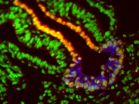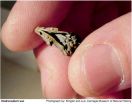In the randomized trial, RTOG 0525 Phase III Trial Comparing Conventional Adjuvant Temozolomide with Dose-Intensive Temozolomide in Patients with Newly Diagnosed Glioblastoma, no significant improvement in overall patient survival or disease progression was observed for patients who received the dose-intensive (dose-dense) TMZ plus radiotherapy as compared to patients who received standard-dose TMZ plus radiotherapy. The trial did however prove the feasibility of collecting and analyzing tumor tissue prospectively in a multi-center setting.. The international trial was led by RTOG principal investigator Mark R. Gilbert, MD (University of Texas M. D. Anderson Cancer Center, Houston) and conducted in concert with the European Organization for Research and Treatment of Cancer (EORTC) and the North Central Cancer Treatment Group (NCCTG). Four presentations will report study results at the 2011 American Society of Clinical Oncology (ASCO) Annual Meeting, June 3-7.
"Given the promising preliminary data of improved patient outcomes using an adjuvant dose-intensive schedule of temozolomide, the trial allowed us to robustly test whether this treatment strategy provides a significant benefit over standard-dose temozolomide treatment," says Gilbert. "While dose-dense temozolomide did not demonstrate improved efficacy for patients newly diagnosed with a glioblastoma, the study results confirmed the prognostic significance of MGMT gene methylation and demonstrated the feasibility of prospective tumor tissue collection, molecular stratification and collection of patient outcomes in a large transatlantic intergroup trial."
One hundred and eighty-five facilities in North America and 24 facilities in Europe enrolled 1173 study participants. Key study eligibility criteria required that tumor tissue, obtained at the time of biopsy or surgery and with patient consent, be sent for central pathology review to confirm the tumor as a glioblastoma and as adequate to perform MGMT gene methylation analysis and molecular risk classification (to assess whether a correlation exists between these biomarkers and study participant outcomes).
Upon pathology confirmation, eligible patients were enrolled in the trial and randomized into one of two adjuvant treatment arms: Arm 1 (standard arm: TMZ days 1-5 every 28 days for up to 12 cycles/months) or Arm 2 (experimental arm: TMZ days 1-21 every 28 days for up to 12 cycles/months).
Study participants were stratified to assess correlation of their outcome with three major criteria: (1) prognostic recursive partitioning (based upon age, performance status, extent of pretreatment surgery, neurologic function and mental status), (2) MGMT status (methylated, unmethylated, or indeterminate) and (3) radiation therapy treatment (US standard vs European).
Trial co-chair for neuropathology and correlative biology Kenneth D. Aldape, MD (M.D. Anderson Cancer Center, Houston), comments, "In this trial we've demonstrated the positive correlation between clinical outcomes and molecular classification of glioblastoma, which will enable improved future prognostic prediction, spur the development of specific therapies based on tumor biology, and ultimately lead to individualization of treatment." Aldape will present findings of the tumor tissue profiling at the 2011 ASCO Annual Meeting.
"This trial was a tremendous undertaking with the complexities of confirming the presence of the MGMT gene as an eligibility criteria—the first time a molecular marker has been used in this manner—and of conducting the trial internationally," says RTOG Group Chair Walter J. Curran, MD, FACR,(Winship Cancer Institute of Emory University, Atlanta). "The collaboration with EORTC and NCCTG significantly helped to expedite trial enrollment and consequentially to expediently report trial results."
The clinical trial also included longitudinal data collection to measure neurocognitive function, symptom burden and health-related quality of life, collectively called net clinical benefits. The important correlations of these measures with outcomes shown by the trial will also be reported at the ASCO meeting, along with seven presentations regarding other RTOG trials.
RTOG 0525 was supported by Award Number U10CA021661 from the National Cancer Institute. The content is solely the responsibility of the authors and does not necessarily represent the official views of the National Cancer Institute or the National Institutes of Health. RTOG also received support from Merck to conduct this trial.
###
RTOG 0525 Abstracts
ASCO Oral Presentation #2006: RTOG 0525: A Randomized Phase III Trial Comparing Standard Adjuvant Temozolomide (TMZ) With a Dose-Dense (dd) Schedule in Newly Diagnosed Glioblastoma (GBM)
Gilbert MR1, Wang M2, Aldape K1, Stupp R3, Hegi M3, Jaeckle KA4, Brown P5, Armstrong TS6, Wefel J1, Corn BW7, Mahajan A1, Schultz CJ8, Erridge S9, Chakravarti A10, Curran WJ11, Mehta M12
ASCO Poster Discussion #2016: Clinical Utility of Neurocognitive Function (NCF), Quality of Life (QOL) and Symptom Assessment as Prognostic Factors for Survival and Measures of Treatment Effects on RTOG 0525
Armstrong TS6, Wang M2, Wefel JS1, Bottomley A9, Mendoza TR1, Coens C13, Werner-Wasik M14, Brachman DG15, Choucair AK16, Gilbert MR1
ASCO Oral Presentation #LBA2000: Phase III Trial Comparing Conventional Adjuvant Temozolomide With Dose-Intensive Temozolomide In Patients With Newly Diagnosed Glioblastoma Aldape K1, Wang M2, Sulman E1, Hegi M3, Colman H1, Jones G17, Chakravarti A10, Mehta M12, Andrews D14, Long L14, Diefes K1, Heathcock L1, Jenkins R18, Schultz CJ8, Gilbert MR1
ASCO Poster Discussion #2017: Variation Over Time and Inter-Dependence Between Disease Progression and Death Among Patients With Glioblastoma (GBM) on RTOG 0525
Wang M2, Dignam J, Won M2, Curran W11, Mehta M12, Gilbert M1
1University of Texas M. D. Anderson Cancer Center, Houston, TX; 2 Radiation Therapy Oncology Group, American College of Radiology, Philadelphia, PA; 3University of Lausanne Hospitals (CHUV), Lausanne, Switzerland; 4Mayo Clinic Jacksonville, Jacksonville, FL; 5Mayo Clinic, Rochester, MN; 6University of Texas Health Science Center, Houston, TX; 7Tel Aviv Sourasky Medical Center, Tel Aviv, Israel; 8Medical College of Wisconsin, Milwaukee, WI; 9European Organisation for Research and Treatment of Cancer Brussels, Belgium; 10The Ohio State University Medical Center, Columbus, OH; 11Winship Cancer Institute of Emory University, Atlanta, GA; 12Northwestern University, Chicago, IL; 13EORTC Statistics, Brussels, Belguim; 14Thomas Jefferson University, Philadelphia, PA;15Arizonia Oncology, Scottsdale, AZ; 16Intermountain Medical Center, Murray, UT; 17MDxHealth, Durham, NC; 18University of California-San Francisco; 19University of Chicago.
The Radiation Therapy Oncology Group (RTOG) is administered by the American College of Radiology (ACR), and located in the ACR Center for Clinical Research in Philadelphia, PA. RTOG is a multi-institutional international clinical cooperative group funded primarily by National Cancer Institute grants CA21661, CA32115 and CA37422. RTOG has 40 years of experience in conducting clinical trials and is comprised of over 300 major research institutions in the United States, Canada, and internationally. The group currently is currently accruing to 40 studies that involve radiation therapy alone or in conjunction with surgery and/or chemotherapeutic drugs or which investigate quality of life issues and their effects on the cancer patient.
The American College of Radiology (ACR) is a national professional organization serving more than 32,000 radiologists, radiation oncologists, interventional radiologists and medical physicists with programs focusing on the practice of radiology and the delivery of comprehensive health care services.
END

